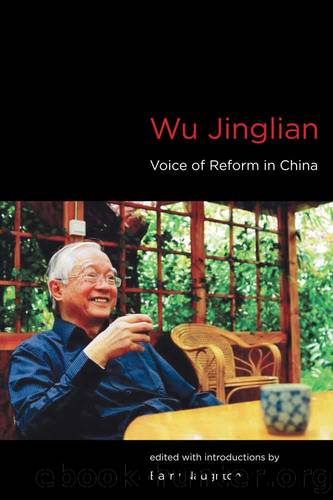Wu Jinglian by Naughton Barry J.;

Author:Naughton, Barry J.; [Jinglian, Wu]
Language: eng
Format: epub
ISBN: 3339676
Publisher: MIT Press
Published: 2013-08-15T00:00:00+00:00
1. Wu Xiaobo, Wu Jinglian Zhuan: Yige Zhongguo Jingjixuejia de Xiaoxiang [Biography of Wu Jinglian: Portrait of a Chinese Economist], Beijing: Zhongxin [China CITIC] Press, 2010, p. 150. Note that, in Chinese, appending the term shichang (market) to Wuâs surname makes it sound as if his personal name is âmarket,â and it has a slightly comical but entirely appropriate feel, which is completely lost in the literal English rendering of âMarket Wu.â But calling him âMr. Marketâ comes close to the feeling in the original, since it is both serious and lightly comic.
2. Indeed the article âA Discussion of Plan and Market as Resource Allocation Mechanisms,â forged in a heated debate with reform opponents in 1990, is reprinted as the first selection in Wuâs Self-selected Volume, under the general category of âBasic Theory of Market-Oriented Economic Reform.â
3. In addition, as we will see later, Wu Jinglian was involved in devising this âauthorized expressionâ in 1984.
4. Wu Xiaobo, pp. 103â104; 109â11.
5. Barry Naughton, Growing Out of the Plan: Chinese Economic Reform, 1978â1993, New York: Cambridge University Press, 1995, pp. 173â86; 202â205.
6. Zhao Ziyang, Prisoner of the State: The Secret Journal of Zhao Ziyang, New York: Simon and Schuster, 2010. Zhaoâs memoirs treat this period well and are convincing, although extremely brief (not surprising, since they were surreptitiously recorded while Zhao was under house arrest, and smuggled out of the country). Barry Naughton, âA Political Economy of Chinaâs Economic Transition,â in Loren Brandt and Thomas Rawski, eds., Chinaâs Great Economic Transformation, New York: Cambridge University Press, 2008, pp. 91â135.
7. Joseph Fewsmith, Dilemmas of Reform in China: Political Conflict and Economic Debate, Armonck, NY: M.E. Sharpe, 1994, is the best account. See also Naughton, Growing Out of the Plan, pp. 187â99.
8. Wu Xiaobo, pp. 126â33 provides an outstanding account of the process.
9. Richard Baum, âDeng Liqun and the Struggle against âBourgeois Liberalization,â 1979â1993,â China Information March 1995, vol. 9, no. 4, pp. 1â35.
10. Wang Renzhi, âOn Opposing Bourgeois Liberalization,âRenmin Ribao [Peopleâs Daily], February 22, 1990; accessed at http://www.cssn.cn/404.html. This speech was originally made on December 25, 1989, and subsequently revised and published in Qiushi Magazine (1990, no. 4), then republished in the main national newspapers.
11. The story is nicely told in Xin Wang, âWu Jinglian in 1990,â Jingji Guanchabao, January 20, 2010; accessed at http://style.sina.com.cn/news/2010-01-20/101655273.shtml. See also Xie Chuntao, âDebates over Plan and Market Economies: An Interview with Wu Jinglian,â Bainianchao, 1998, issue 2, reprinted in Wu Jinglian, 2001, Gaige: Women Zhengzai Guo Daguan [Reform: Now at a Critical Point], Beijing: Sanlian, pp. 300â21, 335â38; and Yang Linlin, âMy Years and Months in Reform: Interview with Wu Jinglian,â in Da Gong Bao [Hong Kong], December 2, 1998, reprinted in Wu Jinglian, 2001.
12. Chen Jun and Hong Nan, eds., Jiang Zemin yu Shehuizhuyi Shichang Jingji Tizhi de TichuâShehuizhuyi Shichange Jingji 20 Nian Huigu [Jiang Zemin and the Formulation of the Socialist Market Economic System: A Twenty-year Retrospective Look at the Socialist Market Economy], Beijing: Zhongyang Wenxian, 2012. This later publication is obviously intended to
Download
This site does not store any files on its server. We only index and link to content provided by other sites. Please contact the content providers to delete copyright contents if any and email us, we'll remove relevant links or contents immediately.
| Accounting | Economics |
| Exports & Imports | Foreign Exchange |
| Global Marketing | Globalization |
| Islamic Banking & Finance |
50 Economics Classics by Tom Butler-Bowdon(2075)
Six Billion Shoppers by Porter Erisman(2007)
Why Nations Fail: The Origins of Power, Prosperity, and Poverty by Daron Acemoglu & James Robinson(1796)
No Time to Say Goodbye(1769)
The Economist [T6, 22 Thg9 2017] by The Economist(1654)
Red Notice by Bill Browder(1603)
Currency Trading For Dummies by Brian Dolan(1558)
Thank You for Being Late by Thomas L. Friedman(1461)
Bitcoin: The Ultimate Guide to the World of Bitcoin, Bitcoin Mining, Bitcoin Investing, Blockchain Technology, Cryptocurrency (2nd Edition) by Ikuya Takashima(1427)
Amazon FBA: Amazon FBA Blackbook: Everything You Need To Know to Start Your Amazon Business Empire (Amazon Empire, FBA Mastery) by John Fisher(1309)
The Great Economists by Linda Yueh(1191)
Coffee: From Bean to Barista by Robert W. Thurston(1188)
The Future Is Asian by Parag Khanna(1179)
Pocket World in Figures 2018 by The Economist(1159)
Capitalism Without Capital: The Rise of the Intangible Economy by Jonathan Haskel(1132)
Grave New World by Stephen D. King(1114)
How Money Got Free: Bitcoin and the Fight for the Future of Finance by Brian Patrick Eha(1113)
The Sex Business by Economist(1091)
Cultural Intelligence by David C. Thomas(1016)
